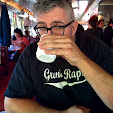When I was younger, I actually read all the science textbooks all the way through. It wasn't difficult, although the age of the books (I went to public school, where some facts or their publications had not changed greatly since Cotton Mather's retirement) provided challenges. As such, I found that pseudoscience filled in the gaps of missing pages or monstrous chronological crevasses quite nicely.
One drawing that stood out was a simple alkaline battery. It was bisected like a tree, the view from amidships, with ions all over the damned place and color-coded rings. I was about six or seven (it was my sister's book. Mine were chapbooks, and insultingly written. Of course I could see Dick run. Of course I saw Ben with the key and the kite. Any imbecile knew these things. I craved SCIENCE, the kind Vincent Price was always doing when he wasn't playing the organ or talking to his dead wife.)
I understood it instantly. It was me. Maybe it was us, but it was absolutely me. We all have rings; the whole introvert/extrovert fad is based on them fulfilling rough ellipses, covalent bonds flailing in a cosmos made of nature and nurture. The cold periwinkle (or was it cadet blue? It's been a while since I had the full crayon buffet at hand) of the atom diagram was a close second, but the battery really clicked (no pun intended.)
We are all everything, just not all the time.
I was always a quiet kid, except when I wasn't. When the opportunity presented itself, I was prepared to do standup at an early age...not the considered, timed standup comedy of the true professional, but the utterly improvised observational work of the stereotypical Irish drunk. Given that I started doing this around the age of four or five years old, I would like to add that I was cold sober. I didn't even drink soda, which was usually the first order of business. "Why do you want bubbles in your mouth? Do you miss the feeling of eating paint?" In the lead-paint-crazed Seventies, that one always killed.
When the spotlight, literal or figurative, wasn't on me, though, I could hide against a white background while wearing a Ronald McDonald costume. I clambered through clothing racks to get from the front door of any given department store to its toy department. I loved jungle gyms, never fell, but never made any of those noises I hear from down the beach. I didn't scream. Even if I was in pain, which occurs with a fair degree of frequency if you're too literate around young athletes, I wasn't much of a screamer. Sharp inhales, though, that I had. I felt, and feel, no need to make extraneous noises. I still get somewhat selfconscious when I cheer at a sporting event. (I'm a Nets fan, so it never happens while I'm watching television. Swearing loudly or cursing the GM using foreign languages doesn't count.)
Why all the quiet, though? Was it because one sister was a chatterbox and the other one was even less introverted? Was it because my unmedicated, bipolar father, who was dying from COPD the entire time, was given copious amounts of steroids? Was it because my mother, who had trailerloads of just cause, occasionally raised her voice instead of caning her three idiot children? I'm not sure. I have my faith that a lot of my inner quiet came from major depressive disorder, the need to evade my peers, and the constant feeling of self-defeat that comes with the aforementioned. I was a ghost who wanted to be a devil. Or Batman. Or Spider-Man. Or, well, not me.
So I disappeared a lot. Sometimes, for my own amusement, I'd reappear directly behind people. My poor mother is 75 when I write this. The fact that she has never needed digoxin or a pacemaker is a testament to her durability, not my good behavior.
I still do it, too. I know how utterly insane this sounds, but I have proof, substantiated by the U.S. Attorney's Office, that I am pretty damn quiet for a six-foot-seven, over-three-hundred-pound behemoth...until you get me on the witness stand, when I become an articulate expert in the nooks and crannies of Amity Road, Selden Place, and the layout of the bank those guys were robbing when I walked in. Don't worry; they didn't hear me.

